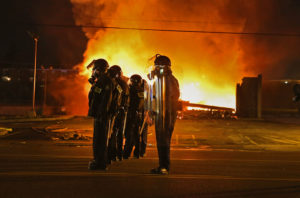In the spring of 2021, after writing two books generally butchering Donald Trump, I received an unlikely invitation to visit him at Mar-a-Lago so I could write a third. Negativity was not something he feared. To the extent it added to the further sturm und drang that surrounded him, he courted it.
For three hours, and in a relaxed mood, he harangued me about the stolen election and all the various bad people, dark forces, and disreputable agencies of government out to get him. This was rendered jauntily, even proudly. He clearly enjoyed the telling. This was his story.
The conversation led to dinner with him and Melania on the Mar-a-Lago terrace and the continuation of his catalogue of grievances, now broadcast to the long line of nightly well-wishers coming to his table. As I tried to leave, he held my arm for a few last-minute words about his unbelievable fortitude in the face of his enemies, adding: “What if they stormed in here to search the place? Mar-a-Lago! Here! Do you believe that’s possible? Well, I wouldn’t put it past them!”
When it did happen, earlier this week, the first word came from Trump himself on his social media network: “My beautiful home, Mar-a-Lago in Palm Beach, Florida, is currently under siege, raided, and occupied by a large group of FBI agents.” He rushed out front as the narrator of events. This was his story, part of his him-against-everyone tale he had been telling for decades. Of course he was going to continue to own it.
Here again was not only his instinctual story sense, but the ratings rule he had learned in 14 years of reality television: the only thing that matters is conflict.
Since 2016, a grateful Republican party — otherwise muddled, out-of-touch, and hopelessly perplexed by its own angry voters — has adopted his vibrant script. And they eagerly took up its latest chapter. This was war. This was the deep state. This was the Gestapo. Even Mitch McConnell, the Republican Senate leader, a man who may despise Trump more than any other in his party, was forced, in the excitement of this new storyline, to take up the defence of the man whose political end he was spending much of his behind-the-scenes energy working to secure.
Now, to be clear: this search, on the face of it, represented a relatively unimportant scuffle between a minor government agency, the National Archives, trying to enforce a point of principle, and the Trump team in Florida, likely more disorganised than it was intransigent. Of all the threats facing Trump — including a criminal investigation in Georgia over election interference; a criminal investigation in Washington that might encompass fraud, obstruction, conspiracy and sedition; and a civil case in New York which could bankrupt him (in which, this week, he plead the Fifth countless times) — this search might be the least of his problems. Little, and perhaps nothing at all, was really at stake beyond pride. And yet, by dint of his own narrative, the search of Mar-a-Lago now put the Justice Department in the crosshairs of Republican rage, gave Trump and his MAGA Republicans a fiery 2024 issue, and helped guarantee that he will run again and declare his intention soon.
The National Archive law spells out strict procedures for the retention of all executive branch documents and material. And all basically means all. It was well-known that Trump ignored or abused these procedures when he was in the White House, or at any rate refused to take the time, or few seconds of concentration, necessary to comprehend them. When he left, the national archivists found, with archivists’ great alarm, that lots of material from the Trump years had gone missing. Mar-a-Lago promptly returned 15 boxes. Nothing had been unpacked and, hence, it was simple to arrange a quick return trip. Of course, it was easy to imagine that lots more boxes were stored here and there on the Mar-a-Lago grounds. That’s what the Archive believed, and for nearly two years they have been negotiating to get their stuff back, only to be met with delays and indifference from Trump’s office. Finally, they took concerted action.
On Monday, when it all went down, this issue of proper record retention was suddenly joined in reports by the issue of classified material. The law prevents anyone, even with security clearance, from removing classified material from its prescribed place. People have gone to jail for this. This, then, was suddenly the charge that liberals were salivating over: Trump purloining national secrets and illegally stashing them at Mar-a-Lago — a jail sentence surely.
But among the complications here, which, by the week’s end, had become a leading and far from incorrect Right-wing talking point, is the unique relationship a president has with national secrets. A president can declassify secrets at will. Other than nuclear secrets, covered under a different specific statute, a president can declare any secret not secret. At several points in his presidency, aides and others feared Trump would do this inadvertently or, even, by mendacious design. Some saw it as his ultimate threat: if you corner me, I’ll tell all our secrets. Nor does there seem to be precise procedure for presidential declassification, although the Left-wing rushed to try to nail one down. If a president utters a secret, it’s declassified. Does a president, taking classified papers with him even in the last moments of his presidency — and Trump was often grabbing handfuls of papers and waving them about, or flushing them down the toilet — constitute declassification? At any rate, it’s a hard case.
This search, therefore, might well be, as so many of the Democrats’ most aggressive legal thrusts against him turned out to be, just one more “nothing burger” — that Trump term of art signifying both liberal impotence and Trump’s Teflon coating. Or not. It remains both unclear what exactly was being looked for and unclear what was found, inadvertently, or otherwise. In theory, a federal judge would only have approved the raid because there was probable cause of a federal crime.
At any rate, you don’t search a once-and-possibly-future president without wanting to make a point. And you probably don’t search just for missing boxes. (It seems pretty likely that all presidents walk out with unintended boxes — former presidents move with the same jumble of stuff as the rest of us.) But was the point greater than showing — as the Right wing was charging — that the DOJ simply has the power to do this? Even various concerned liberals urged the DOJ to explain itself.
Here, though, was just one of the many continuing asynchronicities between Trump and the Democrats: Trump plays for daily short-term gain and popularity and is proudly transparent about it; the Democrats, seeing themselves as long term players, are often hopelessly opaque. Indeed, was the DOJ truly after something, or looking awfully out of it in the shadow of congress’s January 6 investigation, just under pressure to do… something? And was even a nothing-burger search something?
In the days after the search, there were rumours (Democratic rumours, of course) of a secret source at Mar-a-Lago directing the search not just to mishandled documents but to incriminating ones, a smoking gun related to his election plot or, even, nuclear secrets. This was credible — or at least not incredible — because Trump tends to command the opposite of loyalty even among his closest staff. Others described the search as characteristic of the ever-cautions Attorney General, Merrick Garland. He was testing the waters for an indictment and taking careful measures of the potential backlash. Or, already moving towards an indictment of the former president, he was softening up the public for it.
In traditional politics, a politician under this sort of siege would see among his supporters and even in his inner circle a certain winnowing of options. The outlook, everyone would understand, was grim. At best, you could only look to limit the damage. In most instances, the FBI showing up at your door would, alas, mean end of story.
But what has confused liberals for the whole of the Trump era is that almost every mortal legal arrow they have shot at him has had the opposite of its intended effect. They haven’t even hobbled him. They have only ever enlarged the Trump story, creating new options for him, more dedicated supporters, and an ever-grander battlefield.
Most immediately, the FBI search — the “assault” in Trump terms — has become for Trump’s family, inner circle, and MAGA-aligned candidates, a prod to get him to declare his presidential run. It is the persistent state of even the closest Trumpers to know no more about what he will or won’t do or when than anyone else — “the king of optionality,” said one aide recently, with both admiration and annoyance.
Indeed, to their frustration, Trump has reverted to his long history of toying with presidential runs. Perhaps, most honestly, he has told various aides he wants to put off an announcement for as long as possible because he doesn’t want to work as hard as he’d have to with an immediate declaration. (Trump’s fundamental laziness has never received its rightful due as a political consideration.) But their futures are also on the line (and they are hungry for the money to start flowing). Plus, they are worried, in a way that Trump is not, about Florida’s upstart governor, Ron DeSantis, who has been climbing in the polls. In a way, the search is what they have been waiting for. Story-wise, “fuck you” is an irresistible element for Trump. Running, and running now, is the counterpunch from his Roy Cohn handbook.
The relentless push against him, from Mueller to Stormy Daniels, to impeachments one and two, has not only failed to bring him down, but continued to fuel the outrage of his mighty base. He is attacked, he responds — mostly in the kind of head-smacking asymmetrical fashion that confounds procedure-bound liberals and delights so many of his anarchic-leaning followers.
Then, with name-calling, counter-insults, and in the ensuing chaos, he declares that he has prevailed. Arguably, his stolen election plot line has bogged the story down — even he can’t figure out a credible way to declare victory. But shadowy forces in the government coming after him, and, at the same time, him daring them to as the big man standing in the Mar-a-Lago doorway… Well, that’s good. It’s the state against the individual. The Man against our man. It’s violating someone’s home! It’s nasty! Goddamnit, it’s civil war. Victory is him running again (pay no attention to whether he will win). And, as well, it’s all a very sweet money-raising pitch.
In the nearly eight years now since the Trump campaign began, neither the Democrats, nor that stubborn core of anti-Trump Republicans, have managed to find their own storyteller, or to recognise that the language, assumptions, and honour of politics may have changed. Despite massive evidence to the contrary, they have continued to act with the conceit that this is a country of laws not of men, no matter how many times this approach has disappointed them. In this, Merrick Garland, in his opaque, almost lugubrious, fair-mindedness and incrementalism, like Robert Mueller before him, seems to be a perfect representative. Politics is the business of lawyers and not of showmen, Democrats continue to believe that, and the law happens at its own pace without vulgar publicity. As the week went on, Garland, in evident frustration, was forced into a brief public justification for the search. Simultaneously, there were more or less official leaks that it might be “nuclear documents” the FBI was looking for.
Finally, the release of the actual search warrant spelled out some of the possible charges against him, including violating the Espionage Act (which is not spying or treason, though it sounds like it), giving liberals a sudden burst of the kind of hope they have harboured since the long-ago Russian investigation.
But while for others in the public eye an FBI search would be a great humiliation and fearful reckoning, when Trump returns to Palm Beach next month from his summer redoubt at his golf club in Bedminster, New Jersey, and greets club members on the Mar-a-Lago terrace, he will regale them with tales of this attack. He will tell them that this not only represents the end of the republic unless he protects it, but also the stuff of Trump legend — a story of his heroism and his opponents’ impotence.
“Let them come,” he said to me, as my visit ended, a little more than a year ago. “If they think they can get away with that. They probably think they can. How stupid can you get?”
Disclaimer
Some of the posts we share are controversial and we do not necessarily agree with them in the whole extend. Sometimes we agree with the content or part of it but we do not agree with the narration or language. Nevertheless we find them somehow interesting, valuable and/or informative or we share them, because we strongly believe in freedom of speech, free press and journalism. We strongly encourage you to have a critical approach to all the content, do your own research and analysis to build your own opinion.
We would be glad to have your feedback.
Source: UnHerd Read the original article here: https://unherd.com/




